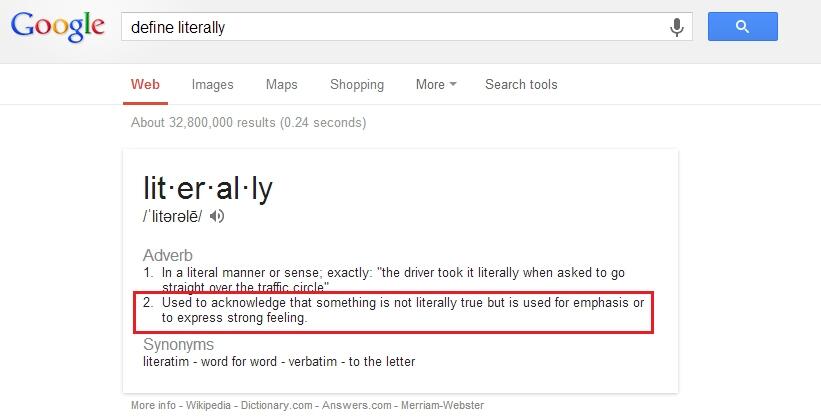Languish
We did it guys! We killed English!
— Magnus (@magnus72) August 12, 2013
That photo and tweet went out yesterday and I'm sure many others tweeted similar things. The photo hit BuzzFeed and Facebook and people mourned the death of the English language. Yes, Google gives a second definition of "literally" as a word used to give emphasis. But, for many reasons, that does not mean the word's definition has changed.
Google's "dictionary" is very intelligent in that it displays the definition for your term using an aggregated definition it has found from a variety of sources, which does include online dictionaries, but may include other websites. In fact, below the definition callout on Google, you can see links to a few of the websites Google used to determine the definition: Wikipedia, Dictionary.com, Answers.com, and Merriam-Webster. Clicking each of those links brings you to that site's definition. And guess what -- none of them have that second definition in the photo.
The issue here is that people are confusing definitions with usage. The definition of "literally" has not changed -- it still means "exactly" or "actually". However, the usage of "literally" has changed, in that some people use the word as an intensifier.
But aside from Google just aggregating data and displaying it to you and dictionaries listing usages below definitions, there's a deeper issue here: the issue of people giving a shit.
Language is a very interesting beast. It is fluid, but also requires strict rules that we've all agreed upon so that we can understand each other. The sole purpose of language is to communicate thoughts, feelings, and ideas to each other in an understandable way. And, we must also understand that language naturally evolves and changes based on usage by those who speak it.
Words we use today do not mean what they originally meant, and the words we start using today will mean something entirely different in 50 or 100 years, or they may not exist at all.
For instance, do you think that it's dumb that people use "literally" as an intensifier? So, by definition, you think that the fact that people use "literally" as an intensifier can't speak because of congenital deafness?
Do you think that that new Robin Thicke song is awesome, so much so that it inspires awe?
Do you often say that something is across from something else? Guess what -- "across" actually means "in the shape of a cross".
Think it's just awful that "literally" is being misused? Then that means you think that the misuse of "literally" is worthy of respect.
Many of the words you use every day are being misused in terms of their original meanings, yet, you haven't gone around on a crusade against people who don't use the word "girl" to refer to either gender, or when someone eats a big meal and says they have heartburn, you don't ask, "Oh, you mean you're lustful, or full of hatred?"
The point of language is to convey information or feelings in an understandable way. When someone says "Drew Brees was literally on fire last Sunday!" you know full-well that Drew Brees was not covered in flames during a football game, but rather the speaker was meaning Drew Brees was playing really, really well. Anyone that actually thinks Drew Brees was actually on fire because of the inclusion of "literally" next to a figurative idiomatic expression is literally an idiot. As long as you can follow what someone is saying, then the language is being used properly.
In conversation or informal writing, say, Facebook or Twitter or most anywhere on the Internet, using words like "literally" in a slang form is completely acceptable. As long as formal writings for school or publication continue to follow the dictionary definition of words, then no harm has been done. But if the definition does get recorded as the colloquial definition, then formal papers are free to use either definition, just like the words I listed above that have evolved to mean something very different.
I think another important thing to note is that many dictionaries exist as historical records of language and do not intend on telling you how to use a word, but rather explain how people are using words. One such dictionary is the Oxford English Dictionary. Many people "cry" when the OED adds words like "bootylicious", complaining that it's a "made-up word". How the hell do you think words come into existence? ALL WORDS ARE MADE-UP WORDS. A human thinks of a group of sounds to string together, they use it a few times, and then other people begin to make that same string of sounds and then we have a word. Words are not some things that were byproducts of the Big Bang; people made them up. And the OED keeps an historical record of those words. "Bootylicious" being in the OED (and similarly, the alternative definition of "literally") does not mean that the official definition has changed or has become a word; it simply means that this is a word that humans are using to refer to something in a certain way and so it is now documented.
Personally, I think it's badass, and I in no way mean a below-average donkey.
No one is forcing you to use the word as an intensifier, so there shouldn't be any outrage. I'm a pretty pedantic person in that I love following English rules. I love the intricacies of the language and how subtle changes can make a huge impact on a sentence. But, as this conjunction leading off this sentence proves, I also don't mind taking liberties with the language in informal settings like this blog. So, as a result, I personally will never use the word "incorrectly", but I won't rail against someone who does in a casual setting.
Now, the Oxford comma? That's a whole different story...
 geoffrey gauchet
geoffrey gauchet
